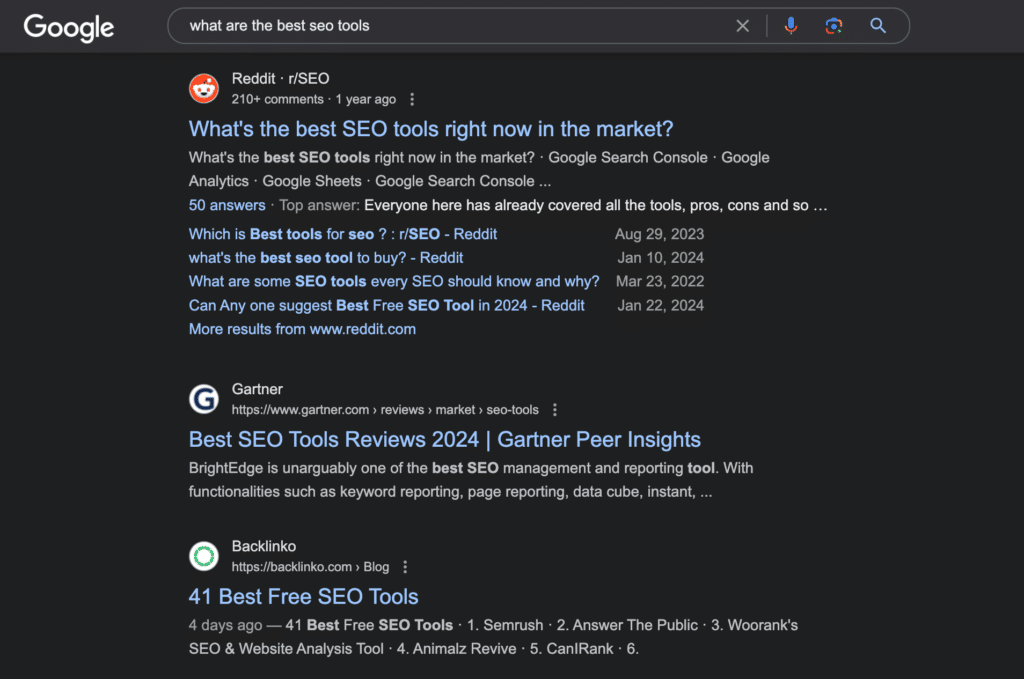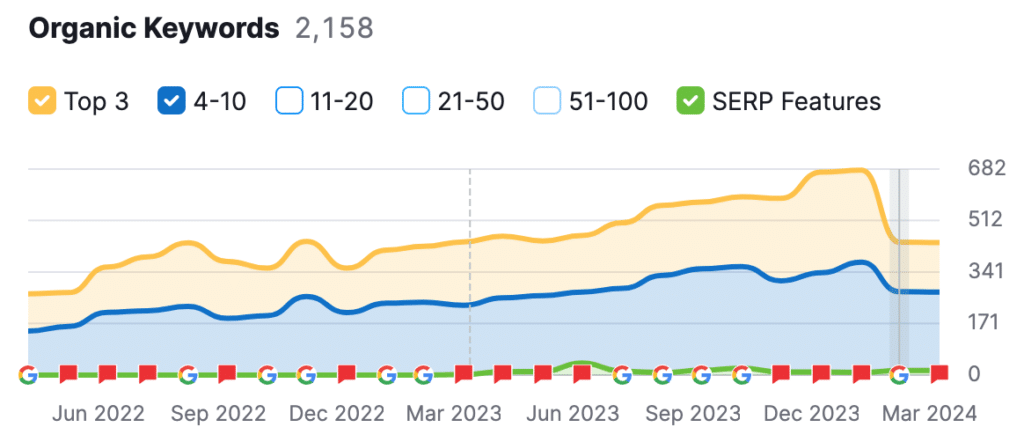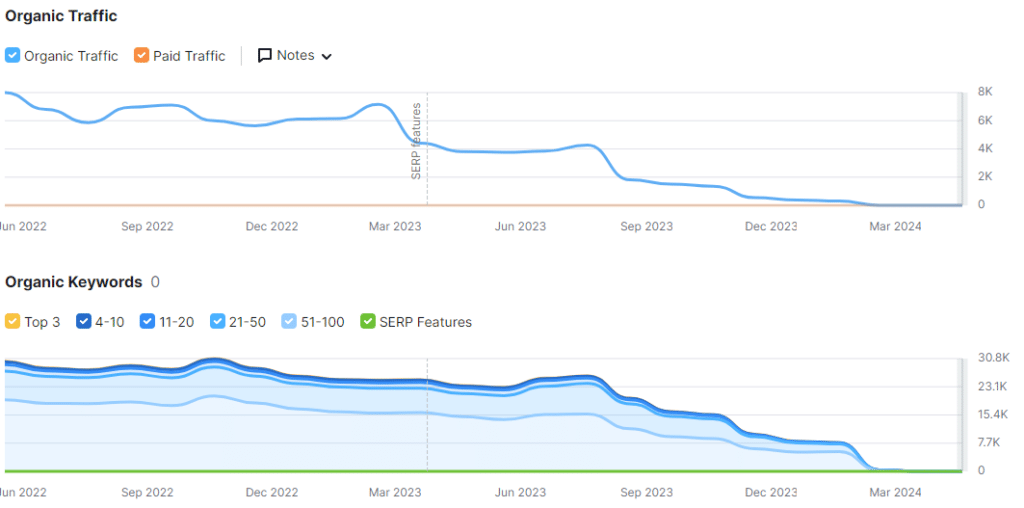
Google’s Longest Algo Rollout Just Finished—And Here’s What It Means

We’ve had eyes on Google’s latest algorithm update, which finally concluded last week after a 45-day rollout period. That’s a pretty hefty rollout for Google, which typically launches updates to its search algorithm over a week or two.
Here’s what you need to know about the update and what we’re doing to ensure our clients maintain and even improve visibility in this changing search landscape.
Understanding Google’s March 2024 Core Update
Google’s core updates shape the way websites are ranked in search results. This update stands out as one of the longest rollouts we’ve ever seen (again, most are completed in two weeks—and this took 3x that). This is indicative of major changes.

We also suspect there were hiccups along the way, as we saw many instances of user-generated content from Reddit and Quora temporarily outranking more authoritative sites during this period before being corrected.

Above, we can see a post on Reddit that was made a year ago is outranking a new, relevant article by backlinko.com. How is a post that was made over a year ago by an anonymous user more helpful than a fresh new article on one of the most predominant SEO websites out there? Google’s new algorithm seems to believe it is.
Longer rollout times often suggest significant shifts in SERPs. This Core Update focused on combating low-quality, unoriginal and unhelpful content—and it worked. With a reduction in low-quality SERP content at around 45%, Google’s commitment to enhancing the overall quality and relevance of its search results seems steadfast.
Effects on Search Rankings
1. Ranking Volatility and Traffic Losses
Following the rollout, many websites have experienced fluctuations in their search rankings. Reports of websites suffering traffic drops exceeding 60% have surfaced, highlighting volatility induced by the update. For those without a user-first, quality-content-focused SEO strategy, these updates will be painful and force a shift in focus.

We have even seen many cases of websites getting deindexed completely after this core update. One standout is Zacjohnson.com, a website populated entirely from AI-generated content. Google picked up on it and removed the entire site from SERPs. While AI can be a helpful tool in many ways, it’s another reminder that Google will not promote websites that use it wholesale. We can see the rapid growth of organic traffic on this website until the March Core Update; from then on, we see a complete drop-off and full deindexation.
Full AI-generated content:


It wasn’t only small websites that were impacted by this update. We can see LinkedIn was also hit pretty hard after this update, specifically LinkedIn Pulse, which enables users to publish articles, blog posts, and other written content directly on their LinkedIn profiles:


LinkedIn Pulse users were mass-generating content in an attempt to increase their profile’s visibility, which inevitably resulted in spam. The new March Core Update seems to have successfully targeted those articles and removed them from search engine results pages.
This underscores Google’s commitment to serving up websites with the most useful, original, and resourceful content in response to a user’s query. Black hat tactics and AI-forward strategies, beware.
2. Crackdown on Violations
The March 2024 Core Update also brought a crackdown on websites violating Google’s guidelines, particularly link spam and manipulation attempts. Websites engaging in such manipulative practices face the risk of deindexation—and Google’s not messing around this time.
For years, many SEOs have believed that acquiring backlinks leads to higher rankings on Google due to the fundamental principles of Google’s search algorithm. Backlinks, or inbound links from other websites, serve as a vote of confidence for a particular webpage, indicating that other websites find the linked content valuable and relevant. With Google’s PageRank update, sites are scored based on the quantity and quality of backlinks they receive. Pages with a higher PageRank score are deemed more authoritative and are likely to rank higher in search results for relevant queries.
And while it’s still true that backlinks can lead to higher rankings, it’s important to remember to prioritize quality over quantity. In the past, Black Hat SEOs purchasing hundreds of backlinks used to work. Websites would see massive improvements in rankings when purchasing links from low-quality websites. However, Google has been cracking down on these tactics by improving its algorithm to penalize websites that delve into such methods of obtaining backlinks, so maintaining ethical SEO practices is key to protecting website rankings.
3. Shift in Ranking Factors
We’re also seeing in this update a shift in the importance of ranking factors, placing greater emphasis on quality, credibility and substantive content. Google has reduced the significance of backlinks in ranking websites, prioritizing content that delivers value to users.
This is likely due to the rise in AI-generated content. With tools such as ChatGPT, creating content has never been easier—which may seem like a boon for lazy marketers or time-strapped small business owners.
However, AI can give baseline information but is not (yet) able to produce high-quality, insightful content that’s contextually relevant to an individual business. AI content rarely dives deep into the subject matter, and it especially does not incorporate the nuances and differentiators between businesses of similar types.
Google wants users to find the information they’re looking for faster, easier and more precisely. This update proves that Google is and will continue prioritizing more high-quality, insightful and credible content.
Google’s Response and New Spam Policies
Since Google is committed to providing users with high-quality, relevant search results, the latest March 2024 Core Update has also implemented new spam policies aimed at combating manipulative behavior. These new policies target three key areas of abuse:
1. Expired Domain Abuse
Expired domain abuse, which involves purchasing old domains with established authority and backlink profiles only to populate them with low-value, spammy content, has long been a concern for Google. These websites exploit the trust and authority associated with the expired domain, deceiving both users and search engines.
To address this issue, Google has improved its algorithm to identify websites engaging in expired domain abuse. By analyzing content quality, relevance and user engagement metrics, Google can determine whether a website is providing value to users or merely attempting to game the system. Websites found guilty of using this tactic risk penalties ranging from lowered search rankings to outright deindexing.
Here is an example of Google cracking down on expired domain abuse: https://demotix.com/ was originally a “camera store” website with a DA of 80. The domain expired and was then purchased and converted into a “guest blog” website. The new website owners probably purchased the domain due to its high DA score. However, after the March Core Update, this website has lost all of its organic traffic and keyword rankings.

2. Site Reputation Abuse
Site reputation abuse involves individuals publishing content on third-party domains pretending to be legitimate extensions of reputable websites. By exploiting the established trust and credibility of first-party sites, their goal is to artificially inflate search rankings and deceive users.
In simple terms, site reputation abuse occurs when a website permits users to contribute content unrelated to its primary industry in an attempt to improve its ranking on SERPs. For instance, suppose I own a highly authoritative website dedicated to sports news. If I allow users to post content on my site regarding unrelated medical/health topics, my website could be flagged for engaging in “site reputation abuse.”
You might be wondering why a website would engage in this practice. There are actually three reasons:
1. Content Volume: Allowing users to contribute content unrelated to the website’s primary focus can result in a higher volume of content. More content may lead to increased website traffic and engagement, which some website owners perceive as beneficial for their online presence.
2. Diversification of Topics: Offering a wide range of topics may attract a broader audience and cater to diverse interests. By allowing users to submit content on various subjects, website owners aim to appeal to a larger demographic and retain visitors who may have varied preferences.
3. Monetization Opportunities: User-generated content can provide opportunities for monetization through advertising, sponsored posts or affiliate marketing. By increasing the volume of content on their website, owners may seek to capitalize on additional revenue streams generated by increased traffic and user engagement.
Google’s response to site reputation abuse is multifaceted, including algorithmic analysis and manual review processes. By assessing the relationship between first-party and third-party domains, Google can identify instances of exploitation and take appropriate action. Website owners are encouraged to monitor their website closely, flagging or deleting any unauthorized third-party content that may hurt their reputation and SEO efforts.
3. Scaled Content Abuse
Scaled content abuse involves the creation of thin, duplicate, or automatically generated content across multiple domains or subdomains. These pages serve no practical purpose other than to artificially inflate a website’s search visibility, undermining the relevance and quality of search results.

Google’s algorithms are getting better at detecting patterns of scaled content abuse, such as duplicate content across multiple domains or excessive keyword stuffing. Through machine learning and natural language processing, Google can discern between genuine, user-centric content and manipulative attempts to game the system. We recommend focusing on delivering valuable, informative content that meets the needs of the target audience.
TL;DR—What Does This Mean for Me?
1. Quality Content is Important
The March 2024 Core Update reinforces the importance of creating original, valuable content that addresses users’ needs and questions comprehensively. Creating content that demonstrates expertise, authority, and trustworthiness (E-A-T) is essential for maintaining and improving search rankings.
2. Compliance Matters
Following Google’s guidelines is essential for sustaining website visibility in search results. There are many types of actions that Google considers black hat SEO, such as keyword stuffing, purchasing backlinks and spamming unhelpful duplicate content.
Users should not try to cheat the system by using black hat tactics. Some websites might see positive short-term success, but sooner or later, Google will catch on and penalize or deindex any website caught violating their guidelines. Compliance with Google’s guidelines not only preserves website rankings but also improves long-term credibility and trust with users.
3. Proactive Optimization is Key
After the March 2024 Core Update, website owners should adopt a proactive approach to optimization. Conducting regular SEO audits, addressing technical issues and refining content strategy are essential for staying ahead of algorithmic changes. By continually optimizing their websites, businesses can adapt to evolving search trends and maintain competitive advantage.
Are SERPs Perfect After the March Core Update?
After the March 2024 Core Update, there has been a noticeable increase in the dominance of Reddit and Quora threads and discussions on Google’s SERPs.
Reddit hosts millions of discussions, questions and answers on virtually every topic imaginable, making it a hub of diverse content. Google’s algorithm, which prioritizes relevance and user engagement, may perceive Reddit threads as valuable resources that provide comprehensive answers to users’ questions.
Reddit’s strong domain authority also contributes to its strength in search results. Google’s algorithm assigns higher credibility to authoritative domains, such as Reddit, making it more likely for Reddit threads to rank well for relevant search queries.
However, despite Reddit’s increased visibility on SERPs, some argue that this outcome was not the intended result of the Core Update. Critics point out that while Reddit may provide valuable insights and information on different topics, it is not always authoritative or trustworthy information. Reddit’s open and democratic structure allows anyone to contribute content, leading to a wide spectrum of quality and accuracy in its discussions. Reddit’s anonymity and lack of editorial oversight can lead to misinformation, biased opinions, and unverified claims.
Critics of Reddit and Quora’s dominance on SERPs argue that Google’s algorithm should prioritize authoritative sources, such as reputable news outlets, academic journals and expert-authored content, over user-generated platforms.
There have also been talks of Google looking to create a partnership with Reddit, which could be an additional reason we’re seeing Google push Reddit pages to the top of SERPs.
Final Thoughts
In conclusion, website owners should employ a user-centric approach to content creation, focusing on producing original, insightful and authoritative content that best answers the needs and questions of their target audience. Ultimately, this kind of content builds trust, reducing the number of page bounces and increasing the likelihood of repeat visits or shares from users. Plus, following Google’s guidelines and steering clear of manipulative tactics means websites can protect their organic rankings and build trust with search engines, too.
Keep Reading
Discover What Drives Results

